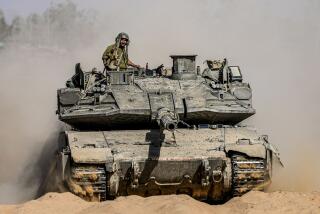Iran tries to ease worries over missile test
A top Iranian nuclear official sought Friday to ease international worries about his nation’s nuclear program days after Tehran test-fired an upgraded medium-range missile that alarmed the West.
Ali Akbar Salehi, head of the country’s Atomic Energy Organization, said Iran won’t have a new generation of more efficient centrifuges for the production of nuclear fuel until 2011 and won’t have its heavy-water plant in Arak operational for “three or four years.”
His statement was a possible attempt at reassuring world powers that there was no hurry to place new sanctions on Iran.
“The new generations of our centrifuges are undergoing the necessary tests in view of enriching uranium,” he said, according to the Fars News Agency. “We are not hurrying at all for entering the phase of industrial-scale production of fuel.”
He said about 6,000 of Iran’s centrifuges were operational. The International Atomic Energy Agency, the nuclear monitoring arm of the United Nations, in its last report said that about half of Iran’s 8,000 centrifuges were enriching uranium.
Iran has struggled to master advanced nuclear technology. The new IR-3 and IR-4 centrifuges can theoretically boost Iran’s nuclear capabilities by more efficiently and quickly teasing out key isotopes, suitable for civilian energy production or bomb manufacturing, from raw uranium. Salehi said Iran hoped it could begin operating the new centrifuges by March 2011.
Iran produces several kilograms of reactor-grade uranium a day at its facility in Natanz. The material, if further refined, could be turned into fuel for a nuclear weapon. The government in Tehran says it is not pursuing atomic weapons, but only energy for civilian purposes, an assertion the U.S. and others distrust.
Salehi also said Iran prefers to purchase fuel for a Tehran medical research reactor rather than swap its enriched uranium for the fuel rods, as proposed by the West and Russia.
“We are in favor of interaction, and the Western governments should not lose this chance,” he said. “We can potentially produce fuel inside the country. However, we prefer to buy from abroad.”
The standoff between the West and the Islamic Republic over the nuclear issue comes amid one of Iran’s worst domestic political crises in decades, sparked by the disputed reelection of President Mahmoud Ahmadinejad in June and the ensuing protest movement.
On Friday, a cleric described by state television as a representative of supreme leader Ayatollah Ali Khamenei called for the death of opposition leaders and a harsh crackdown on anti-government protesters. The statement ratcheted up tensions ahead of anticipated unrest during the days leading up to important Shiite Muslim religious ceremonies.
“Those who intend to press ahead with their conspiracies and spread rumors to please the enemies and undermine the Islamic regime should be put to death in the worst possible manner,” mid-ranking cleric Mohammad-Hossein Rahimian said in comments broadcast by state television. “Their gatherings should be dispersed in such a way that only a few of them would remain, a few who would not be able to do much.”
In contrast, prayer leader Ayatollah Mohammad Emami Kashani, a moderate, urged both sides in the political dispute over the elections to stand down, showing the lingering rift within the political and religious establishment.
“Unfortunately, recently ugly slogans have been chanted and the image of the late imam was defiled,” he said, in reference to a poster of Islamic Republic founder Ayatollah Ruhollah Khomeini that was set ablaze last week under disputed circumstances. “The imam is the identity card of the revolution.”
He also urged government supporters to “keep the atmosphere quiet” and avoid provoking further unrest.
Several thousand government supporters took to the streets of the capital Friday to protest the alleged desecration of Khomeini’s image. They carried banners and chanted slogans against the United States, Israel and Khamenei’s opponents.
Supporters of opposition leader Mir-Hossein Mousavi had applied for a permit to hold a separate rally to condemn the defiling of Khomeini’s picture but did not get a response, reformist websites reported.
Mostaghim is a special correspondent.
More to Read
Start your day right
Sign up for Essential California for news, features and recommendations from the L.A. Times and beyond in your inbox six days a week.
You may occasionally receive promotional content from the Los Angeles Times.






